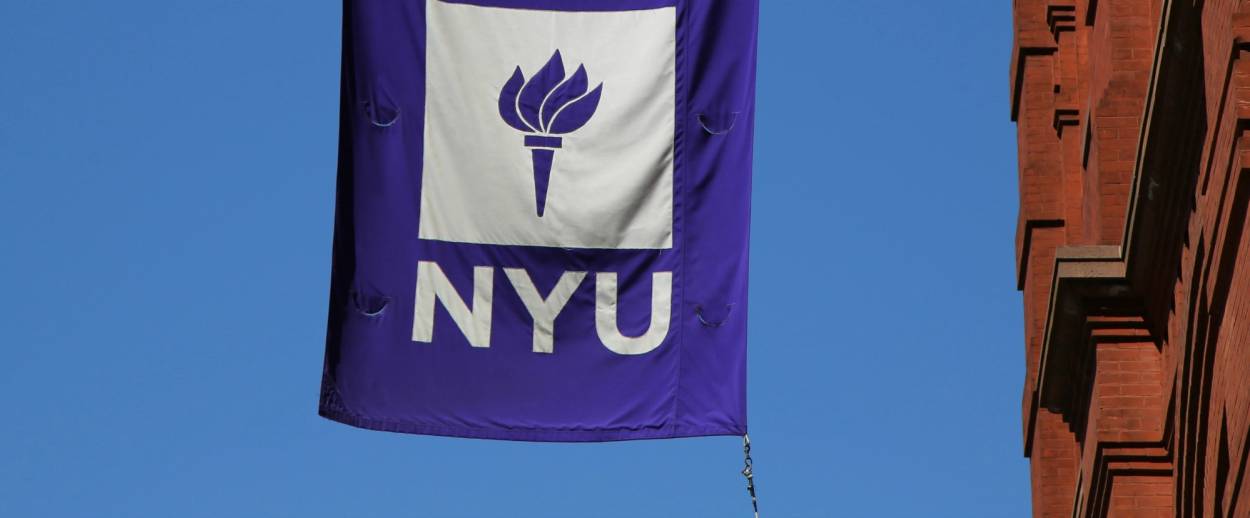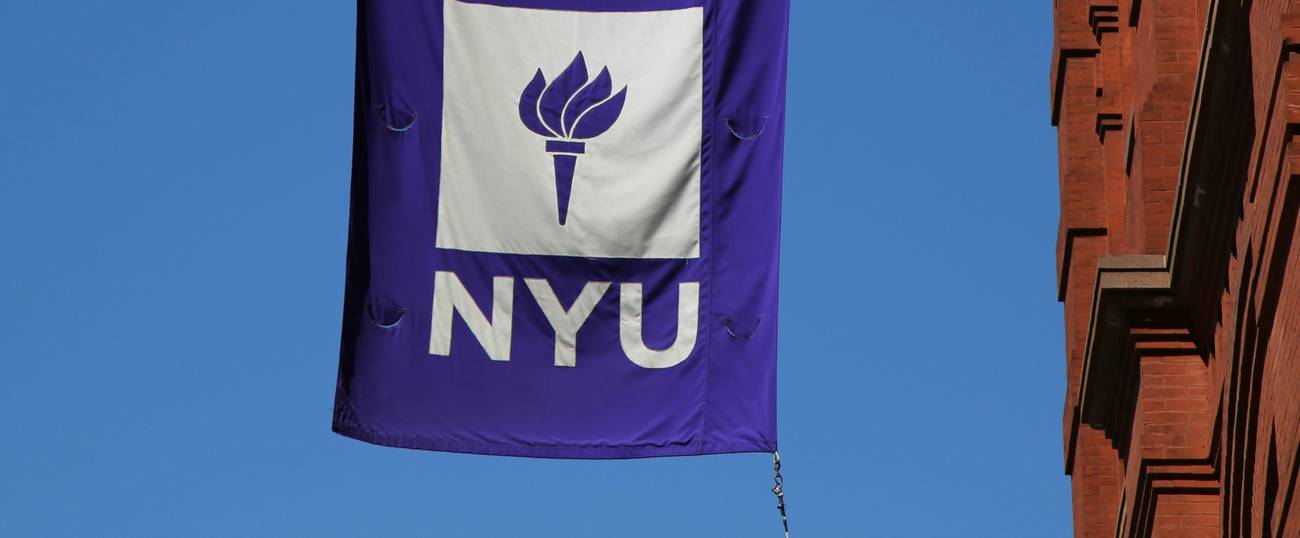A Lesson in Bad Faith
An NYU student accused me of misrepresenting the debate over Israel on campus. It was a teachable moment.




Even though it’s been a few years now since I taught my last class at NYU, my fondness for the university and its students remains deep. For all the infirmities of modern American academia, Washington Square still attracts a certain strain of seeker who is soulful even when he or she is wildly misguided and plays fast and loose with the facts. So when Sam Raskin, a current NYU student, took to Twitter (and, hours later, to email) to demand that I correct a story I wrote about the university earlier this week, I was filled with the old spirit that had made my years at NYU among the most pleasurable of my life. And it’s in that spirit that I now wish to respond to the young man who might as well have been my student, because taking the time to educate ourselves together is a privilege that oughtn’t be constrained only to those lucky and privileged enough to park themselves at pricey oases of higher learning.
What, then, did I get wrong in my article, according to Mr. Raskin? Let us look at his tweets:
The resolution is quite clear it’s only calling on the university to ask Israel to address its policies on NYU students. I’m sure @liel would be happy to make the correction. https://t.co/JKJMIK2Mrg pic.twitter.com/r6f9IUY7IL
— Sam Raskin (@samraskinz) April 9, 2018
Now, to the NYU student government resolution in question. One relevant section, which Mr. Raskin cites in his tweet, reads as follows:
FURTHER BE IT RESOLVED, we demand NYU render its commitment proactive by issuing a formal memorandum to the State of Israel to remove its barricade of entry for Students for Justice in Palestine, Jewish Voice for Peace;
In my original piece, I described the resolution as “demanding that the university call on the Jewish State to undo a recent law barring BDS activists from entering the country.” The resolution, as Mr. Raskin insisted in a later email to me, “did not call on Israel to change its policies on people who practice BDS; rather, it’s specifically urging NYU to issue a memorandum about NYU students who may be impacted by the new laws. So the last clause of your lede is incorrect.”
The argument Mr. Raskin is making, in other words, is this: It is incorrect to argue that the resolution calls on Israel to undo its law barring people who practice BDS; instead, it merely seeks to “remove its barricade of entry” for NYU students—people, presumably—who belong to two groups (Students for Justice in Palestine, Jewish Voices for Peace) that practice BDS. Mr. Raskin’s argument would presumably be that the resolution is interested only in NYU students who practice BDS and not in BDS practitioners in general—a complaint that the State of Israel might conceivably remedy by passing a new law that allows entry to members of the NYU Students for Justice in Palestine chapter while continuing to bar SJP members attending other universities, like Columbia and Yale.
Hair-splitting is not the right word for this kind of argument, especially when attached to a demand for a correction. It is what is known as an argument in bad faith, ie the willful misrepresentation of verifiable realities in the hope that the audience is too distracted to notice, or that the only people listening are your roommates, who think you are awesome. It’s the kind of sophistry that serious people, including professors and journalists, used to scowl at, and rightly so. Making arguments in bad faith undermines the foundation of all intellectual pursuits and disputes, which is the agreement to be bound by a few common rules of evidence and argument in the hope of approaching some form of truth.
Onwards to Mr. Raskin’s second tweet:
On the other hand, “Israel Again Attacked at NYU” is a more alarming framing to people who don’t follow NYU campus politics.
— Sam Raskin (@samraskinz) April 9, 2018
In my piece, I provide two examples to support the word “again,” including a secret anti-Israel conference closed to the university community at large and a student manual focusing on Israel’s sins. Both of these examples are entirely verifiable. Other examples abound, including fake eviction notices distributed by pro-Palestinian activists which distressed many Jewish students on campus.
Now, you are free, of course, as an NYU student or otherwise, not to be in the least bit alarmed by any of these occurrences, and therefore to believe that the headline is an “alarming framing,” and therefore itself misleading and offensive—but only if, for whatever reason, you choose to treat the above-stated facts simply as “narrative,” which is what hacks and political operatives do but aspiring journalists and scholars really shouldn’t do, because it’s dumb. There’ll be plenty of time for that kind of stuff later, like when your editor says that if you don’t do it, you’ll be fired, and then who will feed your starving family? To engage in cheap sophistry without being paid to do it or forced to do it is an offense against art and science, as well as the better angels of our nature.
Tweet number three, below, accuses me of misspeaking when I stated that while NYU’s journalism faculty refused to teach at the university’s Abu Dhabi campus after its government barred Shiite professors from entering, the student body showed no such solidarity.
This is wrong, too. See the NYU student government’s response to the NYU Abu Dhabi situation here: https://t.co/kzoyKomYjT pic.twitter.com/asnmYhhdpQ
— Sam Raskin (@samraskinz) April 9, 2018
As I wrote in my original piece, an open letter from the student government, which Mr. Raskin links to in his tweet but doesn’t bother to explain, makes the following brave statement:
We must make a promise that we will respect the ideologies of the countries we are visitors in. We must make a promise that we are not there to spread the ideologies of the institution, should we continue to insist to center ourselves on Western Enlightenment Liberalism as an institutional truth, but to learn to appreciate the countries that have allowed us to be guests in their space.
If that reads to you like a statement of solidarity with the banished professors rather than with their theocratic censors in Abu Dhabi, you might need to stop by the journalism school for a few more lessons from the principled professors there. It certainly sounds quite different than the demand that Israel allow entry to people—NYU students—who actively work for the country’s destruction, a demand explicitly based on the very same liberal principles that the Abu Dhabi resolution so passionately decries.
The fourth and final tweet takes issue with the following sentence in my piece:
The professors—Lebanese-born Mohamad Bazzi, Arang Keshavarzian, and a third whose identity has not been disclosed, all Shiite Muslims—believe that they were denied a visa because the emirate is ruled by a Sunni royal family that is hostile to their religious beliefs.
How, Mr. Raskin asked, could I know that the third person denied a visa was a Shiite if I didn’t know his or her identity?
Anyone worthy of standing in front of a classroom must acknowledge that professors learn from their students just as frequently as they teach them, and I am grateful to Mr. Raskin for this instructive correction. I do not, indeed, know the identity of the third professor in question, and therefore do not know his or her religion. My statement that all three professors were Shiites was—or, may possibly be—inaccurate, being based simply on the logic that if two professors were denied a visa for the same presumed reason around the same time it’s likely the third one was as well. Again, that’s likely, but not certain. So I stand corrected, maybe.
As I acknowledge Mr. Raskin’s contribution here, I hope he, too, will acknowledge mine. I hope he’ll wean himself of Twitter and the other platforms of facile outrage and eager logic-chopping that make up so much of civic discourse these days. I hope he’ll embrace the kind of intellectual life that, at least when I was teaching there, was still valued at NYU, in place of the self-righteous partisan pinching and tweezering that passes for serious discourse on the left and the right these days, and which squeezes the life out of professions we once esteemed, which some of us have sacrificed much to practice. One day, my young children may read Mr. Raskin and his friends as they graduate from college into newsrooms; for everyone’s sake, I hope these lessons are learned, and soon.
Liel Leibovitz is editor-at-large for Tablet Magazine and a host of its weekly culture podcast Unorthodox and daily Talmud podcast Take One. He is the editor of Zionism: The Tablet Guide.